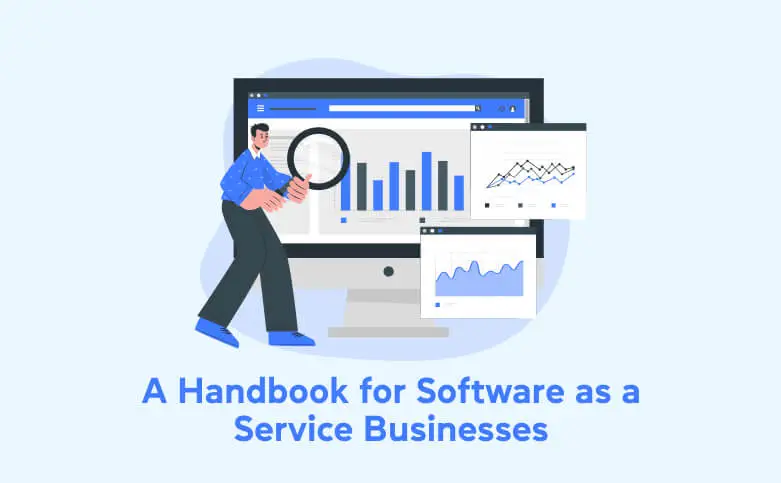Guide to SaaS SEO: A Handbook for Software as a Service Businesses
Your SaaS solution is amazing, yet it’s not getting the traction you expected. Could it be that you’re missing out on the lucrative organic traffic because you haven’t paid enough attention to SaaS SEO? For SaaS companies, a strategic approach to SEO can be the difference between thriving and surviving.
In this post, we’ll explore SaaS SEO—what it is, why it matters, how it differs from traditional SEO, and key optimisation techniques to boost your organic growth.

What Is SaaS SEO?
Search Engine Optimisation (SEO) is the art and science of enhancing a website’s visibility in search engine results pages (SERPs). When we talk about SaaS SEO, we’re specifically referring to SEO practices tailored for SaaS businesses. The primary goal? To attract potential customers searching for software solutions and converting that traffic into leads or paying customers.
Why SEO Is Critical for SaaS Businesses
For SaaS companies, SEO isn’t just ‘nice to have’; it’s a necessity that must be incorporated into the business plan right from the start. Here’s why:
-
- The SaaS Market is Exploding
According to a recent report, the total public cloud market capitalisation has grown 523% in the last 10 years. There are so many SaaS solutions rolling out in every segment that a SaaS company taking SEO lightly has little chance of getting found during user searches. A well-implemented SEO strategy can give you an upper hand over your competitors who may not be leveraging SEO to its full potential.
-
- Marketing Costs are Phenomenal
Research by McKinsey shows that marketing and sales consume over 50% of SaaS companies’ revenues. With SEO correctly dialled in, you can drive consistent and significant free traffic from search listings. This could reduce the expense on paid sources such as PPC and social media ads.
-
- Higher ROI and Conversions
Beyond reducing marketing costs and enhancing discoverability, SEO attracts high-intent customers actively seeking solutions. These customers are more likely to convert compared to traffic from sources like PPC or social media, thereby boosting your return on investment.
-
- Improved User Experience
SEO isn’t just about search engines; it’s about users too. A significant aspect of SEO involves optimising your website for better usability. This improved user experience can not only lead to higher rankings, but also increased engagement, higher retention rates, and more conversions.
How Is SaaS SEO Different?
Though SaaS SEO shares many similarities with traditional SEO, several unique aspects set it apart:
-
- Long Sales Cycles
The decision-making process for purchasing SaaS products is typically longer and involves more research. SEO strategies need to cater to different stages of the buyer’s journey – from awareness and consideration to decision.
-
- Focus on Educating
SaaS companies often need to educate their audience about both the problem and the solution. Therefore, content plays a pivotal role in SaaS SEO. Blog posts, whitepapers, webinars, and FAQs are crucial content types.
-
- Technical Complexity
SaaS websites often feature complex structures and functionalities, demanding advanced technical SEO practices to ensure optimal performance and user experience.
SaaS SEO Checklist
To ensure your SaaS SEO strategy is robust and effective, consider the following checklist:
SEO Audit
An SEO audit is the first step in identifying the strengths and weaknesses of your current SEO strategy. Here’s what to focus on:
- Website Health: Check for broken links, duplicate or thin content, missing pages (404s), mobile friendliness, loading times, and other technical issues.
- Indexability: Consult Google Search Console, your XML sitemap and robots.txt file to ensure search engines can crawl and index your site properly.
- Analytics and Tracking: Set up Google Analytics and Google Search Console to monitor your site’s performance.
Keyword Research
Keyword research for SaaS businesses involves identifying phrases that potential customers use when searching for your type of software. Key steps include:
- Use Keyword Tools: Create a list of focus keywords using tools like Google Keywords Planner, AHREFS and SEMrush
- Identify Primary and Secondary Keywords: Primary keywords are broad terms related to your software, while secondary keywords are more specific and long-tail.
- Analyse Competitors: Look at the keywords your competitors are ranking for and consider targeting those as well.
On-Page SEO
On-page SEO involves optimising individual pages on your website. Focus on these areas:
- Title Tags and Meta Descriptions: Ensure these are compelling and contain your primary keywords.
- Header Tags (H1, H2, etc.): Use header tags to structure your content correctly.
- Keyword Optimisation: Naturally incorporate keywords throughout your content.
Technical SEO
This aspect ensures that your website meets the technical requirements of search engines. Key areas include:
- Site Speed: Slow loading websites put off users, and Google doesn’t like that. Check Google’s speed insights and optimise your site’s loading times.
- Mobile Friendliness: Ensure your site is responsive and offers a good experience on mobile devices.
- Structured Data: Implement schema markup to help search engines understand your content better.
Content Strategy
A solid content strategy can engage, educate, and convert your audience. Focus on the following aspects:
- Blog Posts: Regularly publish in-depth, informative blog posts that address common challenges and queries within your industry.
- Case Studies: Showcase how your product has successfully helped other businesses.
- Whitepapers and Ebooks: Offer valuable, downloadable resources in exchange for users’ contact information.
- Webinars and Tutorials: Create video content that demonstrates your software’s capabilities and benefits.
Off-Page SEO (Link Building)
Backlinks to your on-page content are one of the most important ranking signals because they depict the quality of your content. Adopt the following strategies to build high-quality backlinks from reputable sites:
- Guest Blogging: Contribute valuable articles to authoritative industry blogs with links back to your site.
- Influencer Outreach: Collaborate with industry influencers who can share your content or endorse your software.
- Social Media Engagement: Promote your content on social platforms to increase its visibility and shareability.
- Earned Media: Get mentioned in industry news sites or publications to boost your credibility and referral traffic.
Bringing It All Together
As a SaaS business, carrying out a comprehensive SEO audit, engaging in meticulous keyword research, and ensuring robust on-page and technical SEO practices are critical steps. Crafting a compelling content strategy, focusing on authoritative link-building, and working with an experienced
SaaS SEO agency can take your SEO to the next level. While the journey may be complex, the benefits make it undeniably worthwhile.
Have you begun implementing SEO strategies for your SaaS business, or are there any particular challenges you’re facing? Feel free to share your thoughts or questions, and let’s continue the conversation!








